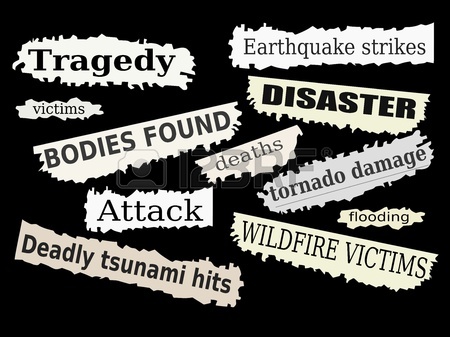Currently, I supervise ten trailer trucks in Uganda, the Pearl of Africa. But five years back, I was a journalist with a promising future. I led a team of over 50 reporters, sub-editors and other non-editorial staff at The News International, a newspaper that touts itself to be Pakistan’s largest circulated English daily.
I was rigorously meticulous about headlines, especially of lead stories. Karachi bleeds. Karachi bleeds again. Terror strikes Islamabad. Suicide blast claims 81 lives. Two dead in twin suicide blasts. Bus-full of Hazaras massacred.
As I grew more experienced and the tragedies began getting more tragic with every passing day, such headlines seemed to lose their impact and looked clichéd. They, to me, failed to translate the real tragedy into words. With my editor, I started spending more time on making more forceful headlines.
Sometimes, I’d make a banner headline. Sometimes, a black banner headline. Sometimes, I’d dedicate the whole front page to the tragic news with grisly pictures carefully cut out by the arts and designing department.
When I was leading the Karachi station, I almost lost my friendship with the news editor of the National Desk.
“Hello Abbas, 20 dead so far. Want it?” I asked him on phone.
It was part of my job to inform the National Desk of important happenings in Karachi.
“Hmm. Hmmmm. No. We’ve a lot on our plate. You can take it,” he replied.
“Sir, they will make a century for sure,” my obtuse crime reporter would shout from his desk with a victorious smile. After all, it was his day, again. His byline was going to appear on the lead story, again. “Ten more gone.”
Two ethnic groups were killing each other on some issue and the death toll was rising.
I, again, called Abbas Rizvi, the news editor for the National Desk. This time he took a little more time to contemplate. But the death of 30 people was still not enough to make it to the front page of the newspaper.
Over 200 dead in the tribal areas. Fifty killed in Islamabad suicide attack. Army about to take over. Governor killed by his security guard. Such stories would leave no place for ’30 dead in Karachi’ on the front page.
So the decision was made. The Karachi killing story would be taken as metropolitan pages’ lead story. We had to finalize our pages by 12 am, at least two hours before the national pages. But the toll was rising.
“Sir, six more,” the crime reporter would shout, his twirling moustache almost touching his eyes because of his widening smile.
I changed the number in the headline and intro.
“Sir, ten more.”
I added some gory words in the intro and the headline to make the story seem a bit more tragic along with increasing the number of the dead.
By 1 am, the death toll reached 73. We decided to close the day at this number.
“Two more.”
“We’ll take that tomorrow,” I said while giving final touches to the headlines and intros.
When I was about to send the metropolitan pages to the printing department, the news editor called.
“The number is high. We have to take the story on national pages,” he said.
“There is no way I’m giving you our lead story at this hour. There can’t be an empty space on our front page,” I was firm.
Our dispute was finally resolved by our polite but judicious editor, Talat Aslam. The national pages would take the first two paras and then refer to the metropolitan pages for the full story.
Before becoming a manager of a transport company in Uganda, I worked as an English language tutor for kids in Oman. For two years.
During my first three months in the Middle Eastern country after I fled Pakistan to save my life, I tried to get a job at a newspaper. Every morning I bought two major English dailies of the country and read every page of them to understand the nature of journalism there.
His Highness receives regards from Saudi King. Such were the lead headlines on the front page most days. Two die in road crash. It was considered the most tragic news. The op-ed pages would contain articles about how to control traffic accidents. Every other local I met was talking about it.
I was desperate and ready to make boring headlines in an Omani newspaper even as a sub-editor. Yet I couldn’t find a job in any of the dailies there, and I started teaching kids at their homes.
Quetta bleeds again. Death toll rises to 70. I saw such headlines in Pakistani newspapers today on my phone while checking the tires of the trucks to be sure if they had not been replaced with old ones by the ‘dishonest’ drivers.
Ten trucks is a lot to manage. Each truck has 18 tires.
Sajid Hussain (1981-2020) was a writer and senior journalist from Balochistan. He had a degree in Economics, International Relations and English Literature from Karachi University. He had the experience of working with Pakistani newspapers Daily Times and The News International. Sajid Hussain was also the founding editor of this online magazine.



